Shocking study: Recycling can release huge amounts of microplastics

Recycling has been promoted by the plastics industry as a key solution to the growing problem of plastic waste. But a study has found that recycling itself can release huge amounts of microplastics.
According to the Guardian an international team of scientists took samples of wastewater from a state-of-the-art recycling plant at an unknown location in the UK. They found that the microplastics released into the water amounted to 13% of the processed plastic.
The facility could release up to 75 billion plastic particles in every cubic metre of wastewater, they estimated.
"I was incredibly shocked," said Erina Brown, lead researcher of the study, which was carried out at Strathclyde University in Glasgow. "It's scary because recycling is designed to reduce the problem and protect the environment. This is a huge problem we are creating."
The researchers tested the water before and after the plant installed a water filtration system and found that the filter reduced the concentration of microplastics from 13% in the treated plastic to 6%.
The estimate of 75 billion particles per cubic metre is for a plant with a filter installed. The majority of the particles were smaller than 10 micrometers, about the diameter of a human red blood cell, and over 80% were smaller than five micrometers, Brown said.
Microplastics, usually considered to be any plastic particle smaller than 5 mm in size, have been found everywhere from freshly fallen snow in Antarctica to the depths of the oceans, and can be toxic to animals and plants.
The results also revealed high levels of microplastics in the air around the recycling facility, with 61% of the particles being less than 10 microns in size. Particles smaller than 10 microns in size have been linked to human disease.
The facility was a "best-case scenario," Brown said, since it had made efforts to install water filters when many other recycling facilities may not have done so.
Microplastics from recycling:
Find out what the other plants are emitting
"An important element is what other plants are emitting globally," he said. "That's something we really need to learn."
The study, published in Journal of Hazardous Material Advances, indicates that the recycling plant discharged up to 2 933 metric tonnes of microplastics per year before the introduction of the filtration system and up to 1 366 metric tonnes afterwards.
"More than 90% of the particles we found were under 10 microns and 80% was under 5 microns," Brown said. "These are easily digested by very many different organisms and were found to be ingested by humans."
"For me, it underlines how drastically we need to reduce plastic consumption and production."
Globally, only 9% of the approximately 370 million metric tonnes of plastic produced is recycled.
Judith Enck, a former senior official at the US Environmental Protection Agency who now leads the lobbying group Beyond Plastics, said: "The findings are concerning but not surprising. This one recycling facility, a state-of-the-art facility, demonstrates the serious problem of plastics use. It causes serious problems, even in terms of the infrastructure for recycling plastics. It is a clarion call for less use.
Source: ieidiseis.gr







